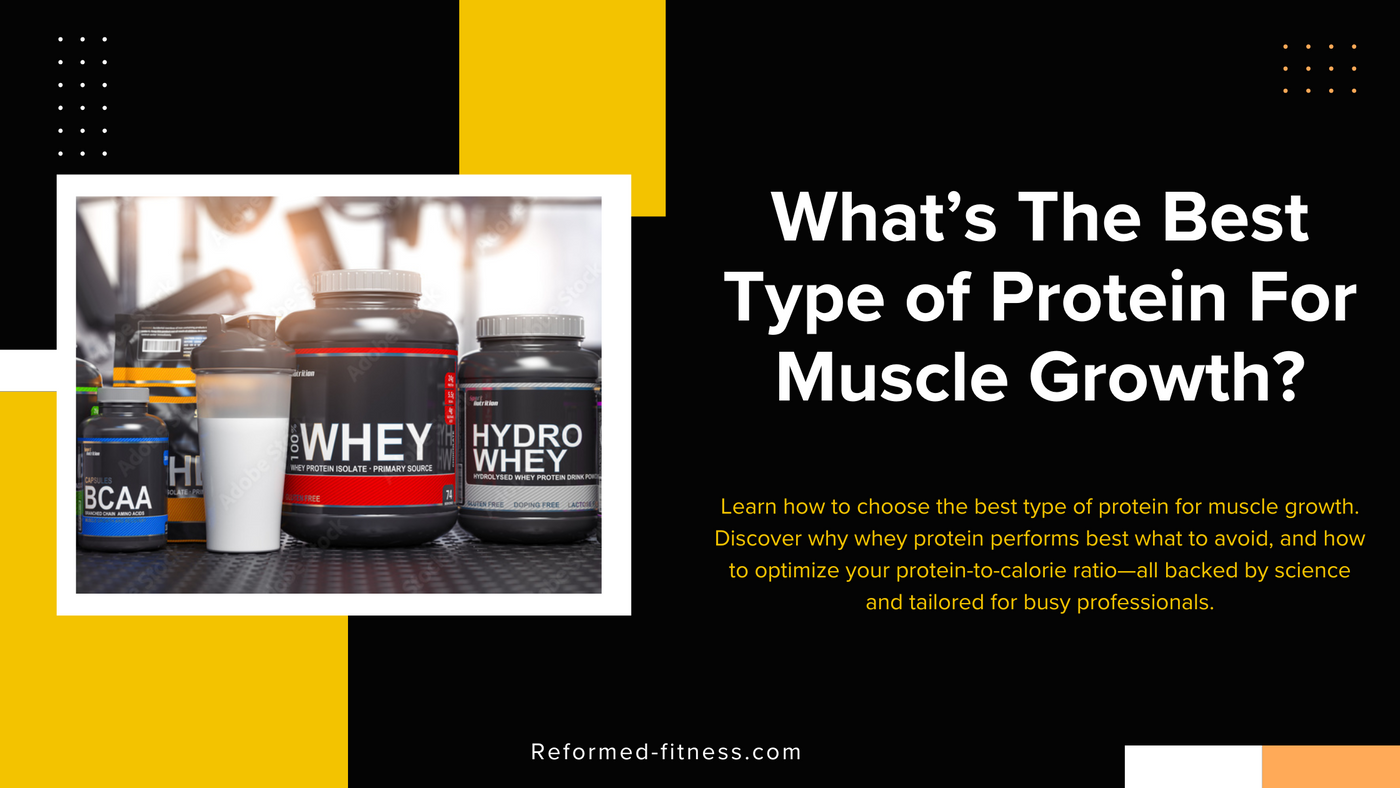As a busy professional, you’re already balancing the demands of your career, your family, and your health. When it comes to strength training and nutrition, simplicity and effectiveness aren’t just nice—they’re necessary.
If your goal is to build lean muscle efficiently, you already know that protein is essential. But with so many options on the market—collagen, vegan blends, whey isolates, and more—it’s easy to get overwhelmed or make the wrong choice.
Let’s clear the confusion. Not all protein is created equal, and choosing the right type can be the difference between spinning your wheels and making consistent, noticeable progress.
The Role of Protein in Muscle Growth
Protein isn’t just about repair—it’s about growth. After resistance training, your muscles need the right building blocks to recover and get stronger. One of the most critical components in that process is leucine, a branched-chain amino acid (BCAA) that stimulates muscle protein synthesis. If your protein source is lacking in leucine, it’s not giving your body the full signal to grow.
What to Avoid When Choosing a Protein Supplement For Muscle Growth
Let’s start with the common pitfalls. Many people unknowingly choose protein products that simply don’t support muscle growth effectively.
Collagen Protein
Collagen may be great for your skin or joints, but when it comes to building muscle, it falls short. Collagen lacks essential amino acids like leucine, meaning it doesn’t adequately stimulate muscle protein synthesis. The research is clear: collagen is not an effective protein source for muscle hypertrophy (Jäger et al., 2017).
Protein Blends (Especially Plant-Based)
Protein blends often sound promising—after all, variety is good, right? But many blends, particularly vegan blends, under-deliver on amino acid quality. The more ingredients included, the more diluted the leucine content typically is. Worse, they often contain fillers, extra carbs, and fats, which can drive up the calorie count without improving the protein quality.
Overly Flavored or Processed Proteins
If the ingredient list reads like a paragraph, that’s a red flag. Many commercial protein powders are full of artificial flavors, gums, and additives. These extras add unnecessary calories and reduce the protein-to-calorie ratio, meaning you’re getting less of what you actually need.
What to Look For in a Protein Supplement
If you want to build or maintain muscle effectively, especially in just two 30-minute strength training sessions per week, your nutrition needs to work as hard as you do. Here’s what to prioritize:
Whole Foods First
Your best protein sources are still found in whole foods—chicken, fish, beef, and eggs are complete proteins, rich in essential amino acids. Ideally, these should make up the bulk of your daily intake.
Whey Protein (Isolate or Concentrate)
For supplementation, whey protein is the gold standard. It’s rich in leucine, quickly absorbed, and highly effective for stimulating muscle protein synthesis. Numerous studies, including one published in the American Journal of Clinical Nutrition (Tang et al., 2009), show that whey protein outperforms other forms for building lean mass.
If you’re lactose sensitive, opt for whey isolate, which contains less lactose and fewer carbs than concentrate.
Vegan or Vegetarian? Choose Wisely
For plant-based individuals, quality still matters. Pea, soy, or potato protein isolates are better options because they have more complete amino acid profiles and higher leucine content than most blended plant proteins.
Watch the Protein-to-Calorie Ratio
A simple rule: look for a 6:1 protein-to-calorie ratio. That means for every 20 grams of protein, you shouldn’t be consuming more than 120 calories. This ensures that you’re prioritizing lean muscle support—not added sugars or filler ingredients.
Final Thoughts: Choose Protein That Matches Your Goals
Your protein supplement shouldn’t just check a box—it should actively support the results you’re working for in your workouts. Whether you're building muscle, preserving lean mass during fat loss, or recovering more efficiently, choosing the right protein source is a key part of the equation.
At Reformed Fitness, we help busy professionals simplify this process. We design time-efficient workouts and nutritional strategies that remove the guesswork—so you can focus on what matters most: results, not routines.
Want help dialing in your strength training and nutrition?
📅 Schedule your FREE Discovery Call today, and let’s build your plan from the ground up.
References
Jäger, R., et al. (2017). “International Society of Sports Nutrition Position Stand: protein and exercise.” Journal of the International Society of Sports Nutrition.
Tang, J. E., et al. (2009). “Differential responses of muscle protein synthesis to different protein sources.” American Journal of Clinical Nutrition.

